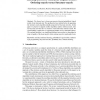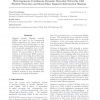123 search results - page 9 / 25 » Learning the structure of Markov logic networks |
ECML
2007
Springer
14 years 1 months ago
2007
Springer
We discuss how to learn non-recursive directed probabilistic logical models from relational data. This problem has been tackled before by upgrading the structure-search algorithm i...
ECAI
2008
Springer
13 years 9 months ago
2008
Springer
Time is a crucial variable in planning and often requires special attention since it introduces a specific structure along with additional complexity, especially in the case of dec...
ICML
2010
IEEE
13 years 6 months ago
2010
IEEE
Classical dynamic Bayesian networks (DBNs) are based on the homogeneous Markov assumption and cannot deal with heterogeneity and non-stationarity in temporal processes. Various ap...
ICML
2006
IEEE
14 years 8 months ago
2006
IEEE
We present a new unsupervised algorithm for training structured predictors that is discriminative, convex, and avoids the use of EM. The idea is to formulate an unsupervised versi...
PERCOM
2003
ACM
14 years 29 days ago
2003
ACM
Seeking to extend the functional capability of the elderly, we explore the use of probabilistic methods to learn and recognise human activity in order to provide monitoring suppor...


